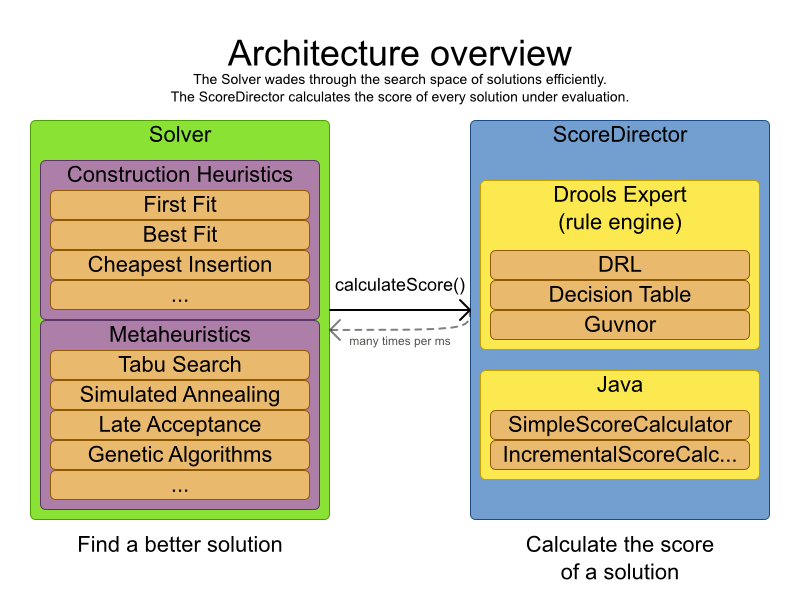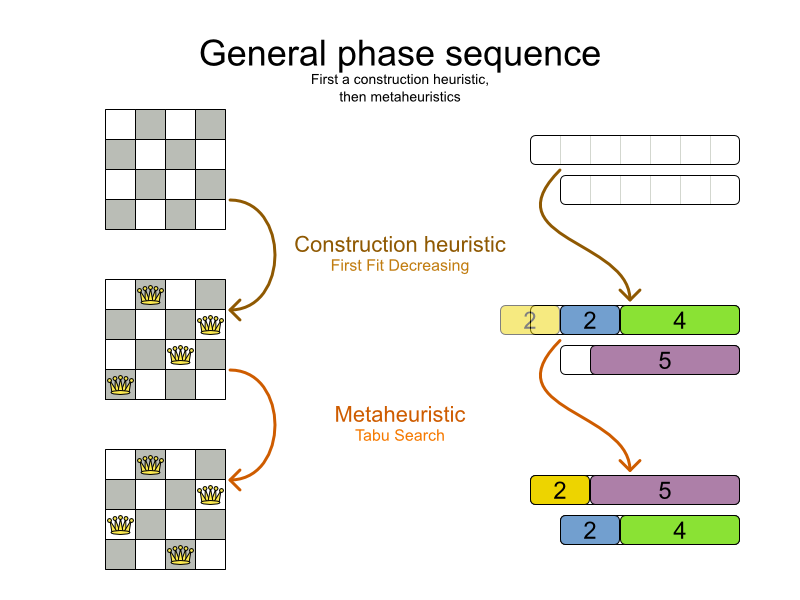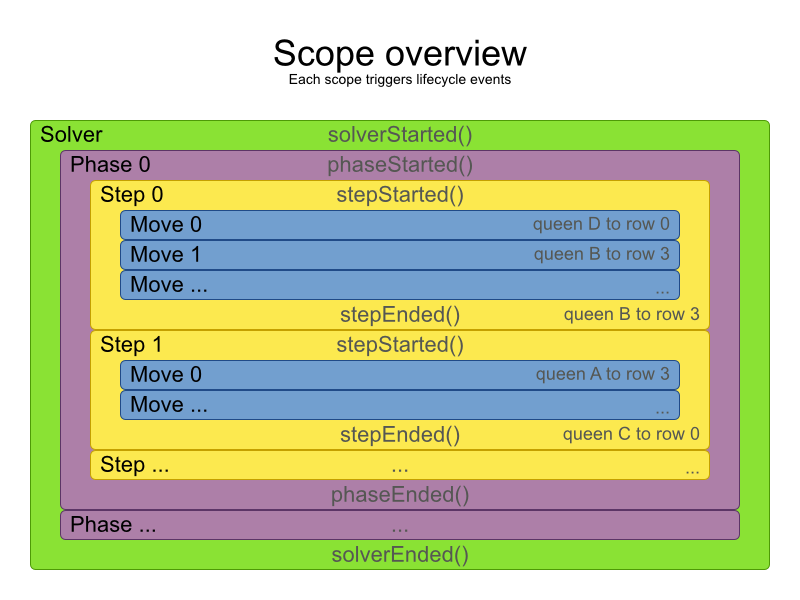The number of possible solutions for a planning problem can be mind blowing. For example:
4 queens has
256possible solutions (4 ^ 4) and 2 optimal solutions.5 queens has
3125possible solutions (5 ^ 5) and 1 optimal solution.8 queens has
16777216possible solutions (8 ^ 8) and 92 optimal solutions.64 queens has more than
10^115possible solutions (64 ^ 64).Most real-life planning problems have an incredible number of possible solutions and only 1 or a few optimal solutions.
For comparison: the minimal number of atoms in the known universe (10^80). As a planning problem gets bigger, the search space tends to blow up really fast. Adding only 1 extra planning entity or planning value can heavily multiply the running time of some algorithms.
An algorithm that checks every possible solution (even with pruning) can easily run for billions of years on a single real-life planning problem. What we really want is to find the best solution in the limited time at our disposal. Planning competitions (such as the International Timetabling Competition) show that local search variations (tabu search, simulated annealing, ...) usually perform best for real-world problems given real-world time limitations.
The business wants the optimal solution, but they also have other requirements:
Scale out: Large production datasets must not crash and have good results too.
Optimize the right problem: The constraints must match the actual business needs.
Available time: The solution must be found in time, before it becomes useless to execute.
Reliability: Every dataset must have at least a decent result (better than a human planner).
Given these requirements, and despite the promises of some salesmen, it's usually impossible for anyone or anything to find the optimal solution. Therefore, Planner focuses on finding the best solution in available time. In realistic, independent competitions, Planner often comes out as the best reusable software.
The nature of NP-complete problems make scaling a prime concern. The result quality of a small dataset guarantees nothing about the result quality of a large dataset. Scaling problems cannot be mitigated by hardware purchases. Start testing with a production sized dataset as soon as possible. Don't asses quality on small datasets (unless production encounters such datasets). Instead, solve a production sized dataset and compare with the results of longer execution, different algorithms and - if available - the human planner.
OptaPlanner is the first framework to combine optimization algorithms (metaheuristics, ...) with score calculation by a rule engine such as Drools Expert. This combination turns out to be a very efficient, because:
A rule engine such as Drools Expert is great for calculating the score of a solution of a planning problem. It makes it easy and scalable to add additional soft or hard constraints such as "a teacher shouldn't teach more then 7 hours a day". It does delta based score calculation without any extra code. However it tends to be not suitable to actually find new solutions.
An optimization algorithm is great at finding new improving solutions for a planning problem, without necessarily brute-forcing every possibility. However it needs to know the score of a solution and offers no support in calculating that score efficiently.

Table 6.1. Optimization algorithms overview
| Algorithm | Scalable? | Optimal? | Easy to use? | Tweakable? | Requires CH? |
|---|---|---|---|---|---|
| Exact algorithms | |||||
| Brute force | 0/5 | 5/5 | 5/5 | 0/5 | No |
| Branch and bound | 0/5 | 5/5 | 4/5 | 1/5 | No |
| Construction heuristics (CH) | |||||
| First Fit | 5/5 | 1/5 | 5/5 | 1/5 | No |
| First Fit Decreasing | 5/5 | 2/5 | 4/5 | 2/5 | No |
| Best Fit | 5/5 | 2/5 | 4/5 | 2/5 | No |
| Best Fit Decreasing | 5/5 | 2/5 | 4/5 | 2/5 | No |
| Cheapest Insertion | 3/5 | 2/5 | 5/5 | 2/5 | No |
| Metaheuristics (MH) | |||||
| Local search | |||||
| Hill-climbing | 5/5 | 2/5 | 4/5 | 3/5 | Yes |
| Tabu search | 5/5 | 4/5 | 3/5 | 5/5 | Yes |
| Simulated annealing | 5/5 | 4/5 | 2/5 | 5/5 | Yes |
| Late acceptance | 5/5 | 4/5 | 3/5 | 5/5 | Yes |
| Evolutionary algorithms | |||||
| Evolutionary strategies | 4/5 | 3/5 | ?/5 | ?/5 | Yes |
| Genetic algorithms | 4/5 | 3/5 | ?/5 | ?/5 | Yes |
If you want to learn more about metaheuristics, read the free book Essentials of Metaheuristics or Clever Algorithms.
The best optimization algorithms configuration for your use case depends heavily on your use case. Nevertheless, this vanilla recipe will get you into the game with a pretty good configuration, probably much better than what you're used to.
Start with a quick configuration that involves little or no configuration and optimization code:
First Fit
Next, implement planning entity difficulty comparison and turn it into:
First Fit Decreasing
Next, implement moves and add tabu search behind it:
First Fit Decreasing
Tabu search (use planning entity tabu)
At this point the free lunch is over. The return on invested time lowers. The result is probably already more than good enough.
But you can do even better, at a lower return on invested time. Use the Benchmarker and try a couple of simulated annealing configurations:
First Fit Decreasing
Simulated annealing (try several starting temperatures)
And combine them with tabu search:
First Fit Decreasing
Simulated annealing (relatively long time)
Tabu search (relatively short time)
If you have time, continue experimenting even further. Blog about your experiments!
A Solver can use multiple optimization algorithms in sequence. Each
optimization algorithm is represented by a SolverPhase. There is never more than 1
SolverPhase solving at the same time.
Note
Some SolverPhase implementations can combine techniques from multiple optimization
algorithms, but they are still just 1 SolverPhase. For example: a local search
SolverPhase can do simulated annealing with planning entity tabu.
Here's a configuration that runs 3 phases in sequence:
<solver>
...
<constructionHeuristic>
... <!-- First phase: First Fit decreasing -->
</constructionHeuristic>
<localSearch>
... <!-- Second phase: Simulated annealing -->
</localSearch>
<localSearch>
... <!-- Third phase: Tabu search -->
</localSearch>
</solver>
The solver phases are run in the order defined by solver configuration. When the first phase terminates, the
second phase starts, and so on. When the last phase terminates, the Solver terminates. Usually, a
solver will first run a construction heuristic and then run 1 or multiple metaheuristics:

Some phases (especially construction heuristics) will terminate automatically. Other phases (especially metaheuristics) will only terminate if the phase is configured to terminate:
<solver>
...
<termination><!-- Solver termination -->
<maximumSecondsSpend>90</maximumSecondsSpend>
</termination>
<localSearch>
<termination><!-- Phase termination -->
<maximumSecondsSpend>60</maximumSecondsSpend><!-- Give the next phase a chance to run too, before the Solver terminates -->
</termination>
...
</localSearch>
<localSearch>
...
</localSearch>
</solver>
If the Solver terminates (before the last phase terminates itself), the current phase is
terminated and all subsequent phases won't run.
A solver will iteratively run phases. Each phase will usually iteratively run steps. Each step, in turn, usually iteratively runs moves. These form 4 nested scopes: solver, phase, step and move.

Configure logging to display the log messages of each scope.
Not all phases terminate automatically and sometimes you don't want to wait that long anyway. A
Solver can be terminated synchronously by up-front configuration or asynchronously from another
thread.
Especially metaheuristic phases will need to be told when to stop solving. This can be because of a number of reasons: the time is up, the perfect score has been reached, ... The only thing you can't depend on, is on finding the optimal solution (unless you know the optimal score), because a metaheuristic algorithm generally doesn't know it when it finds the optimal solution. For real-life problems this doesn't turn out to be much of a problem, because finding the optimal solution could take billions of years, so you 'll want to terminate sooner anyway. The only thing that matters is finding the best solution in the available time.
For synchronous termination, configure a Termination on a Solver or a
SolverPhase when it needs to stop. You can implement your own Termination, but
the build-in implementations should suffice for most needs. Every Termination can calculate a
time gradient (needed for some optimization algorithms), which is a ratio between the time
already spend solving and the estimated entire solving time of the Solver or
SolverPhase.
Terminates when an amount of time has been reached:
<termination>
<maximumTimeMillisSpend>500</maximumTimeMillisSpend>
</termination>
<termination>
<maximumSecondsSpend>10</maximumSecondsSpend>
</termination>
<termination>
<maximumMinutesSpend>5</maximumMinutesSpend>
</termination>
<termination>
<maximumHoursSpend>1</maximumHoursSpend>
</termination>
Note
If you use this Termination, you will most likely sacrifice perfect reproducibility
(even with environmentMode REPRODUCIBLE) because of an available CPU time
difference:
The available CPU time influences the number of steps that can be taken, which might be a few more or less.
The
Terminationmight produce slightly different time gradient values, which will send time gradient based algorithms (such as simulated annealing) on a radically different path.
Terminates when a certain score has been reached. You can use this Termination if you
know the perfect score, for example for 4 queens:
<termination>
<scoreAttained>0</scoreAttained>
</termination>
For a planning problem with hard and soft constraints, it could look like this:
<termination>
<scoreAttained>0hard/-5000soft</scoreAttained>
</termination>
You can use this Termination to terminate once it reaches a feasible solution.
Terminates when an amount of steps has been reached:
<termination>
<maximumStepCount>100</maximumStepCount>
</termination>
This Termination can only be used for a SolverPhase, not for the
Solver itself.
Terminates when the best score hasn't improved in a number of steps:
<termination>
<maximumUnimprovedStepCount>100</maximumUnimprovedStepCount>
</termination>
If the score hasn't improved recently, it's probably not going to improve soon anyway and it's not worth the effort to continue. We have observed that once a new best solution is found (even after a long time of no improvement on the best solution), the next few steps tend to improve the best solution too.
This Termination can only be used for a SolverPhase, not for the
Solver itself.
Terminations can be combined, for example: terminate after 100 steps or if a score of 0 has been reached:
<termination>
<terminationCompositionStyle>OR</terminationCompositionStyle>
<maximumStepCount>100</maximumStepCount>
<scoreAttained>0</scoreAttained>
</termination>
Alternatively you can use AND, for example: terminate after reaching a feasible score of at least -100 and no improvements in 5 steps:
<termination>
<terminationCompositionStyle>AND</terminationCompositionStyle>
<maximumUnimprovedStepCount>5</maximumUnimprovedStepCount>
<scoreAttained>-100</scoreAttained>
</termination>
This example ensures it doesn't just terminate after finding a feasible solution, but also completes any obvious improvements on that solution before terminating.
Sometimes you'll want to terminate a Solver early from another thread, for example because a user action or
a server restart. This cannot be configured by a Termination as it's impossible to predict when
and if it will occur. Therefore the Solver interface has these 2 thread-safe methods:
public interface Solver {
// ...
boolean terminateEarly();
boolean isTerminateEarly();
}
If you call the terminateEarly() method from another thread, the
Solver will terminate at its earliest convenience and the solve() method
will return in the original Solver thread.
Each time a new best solution is found, the Solver fires a
BestSolutionChangedEvent.
To listen to such events, add a SolverEventListener to the
Solver:
public interface Solver {
// ...
void addEventListener(SolverEventListener eventListener);
void removeEventListener(SolverEventListener eventListener);
}
Between phases or before the first phase, you might want to execute a custom action on the
Solution to get a better score. Yet you'll still want to reuse the score calculation. For
example, to implement a custom construction heuristic without implementing an entire
SolverPhase.
Note
Most of the time, a custom construction heuristic is not worth the hassle. The supported constructions
heuristics are configurable (so you can tweak them with the Benchmarker),
Termination aware and support partially initialized solutions too.
Implement the CustomSolverPhaseCommand interface:
public interface CustomSolverPhaseCommand {
void changeWorkingSolution(ScoreDirector scoreDirector);
}
For example:
public class ExaminationSolutionInitializer implements CustomSolverPhaseCommand {
public void changeWorkingSolution(ScoreDirector scoreDirector) {
Examination examination = (Examination) scoreDirector.getWorkingSolution();
for (Exam exam : examination.getExamList()) {
Score unscheduledScore = scoreDirector.calculateScore();
...
for (Period period : examination.getPeriodList()) {
scoreDirector.beforeVariableChanged(exam, "period");
exam.setPeriod(period)
scoreDirector.afterVariableChanged(exam, "period");
Score score = scoreDirector.calculateScore();
...
}
...
}
}
}
Warning
Any change on the planning entities in a CustomSolverPhaseCommand must be notified to the
ScoreDirector.
Warning
Do not change any of the planning facts in a CustomSolverPhaseCommand. That will corrupt
the Solver because any previous score or solution was for a different problem. If you want to
do that, see repeated planning and real-time planning instead.
And configure it like this:
<solver>
...
<customSolverPhase>
<customSolverPhaseCommandClass>org.optaplanner.examples.examination.solver.solution.initializer.ExaminationSolutionInitializer</customSolverPhaseCommandClass>
</customSolverPhase>
... <!-- Other phases -->
</solver>
It's possible to configure multiple customSolverPhaseCommandClass instances, which will be
run in sequence.
Important
If the changes of a CustomSolverPhaseCommand don't result in a better score, the best
solution won't be changed (so effectively nothing will have changed for the next SolverPhase or
CustomSolverPhaseCommand). To force such changes anyway, use
forceUpdateBestSolution:
<customSolverPhase>
<customSolverPhaseCommandClass>...MyUninitializer</customSolverPhaseCommandClass>
<forceUpdateBestSolution>true</forceUpdateBestSolution>
</customSolverPhase>
Note
If the Solver or SolverPhase wants to terminate while a
CustomSolverPhaseCommand is still running, it will wait to terminate until the
CustomSolverPhaseCommand is done, however long that takes.